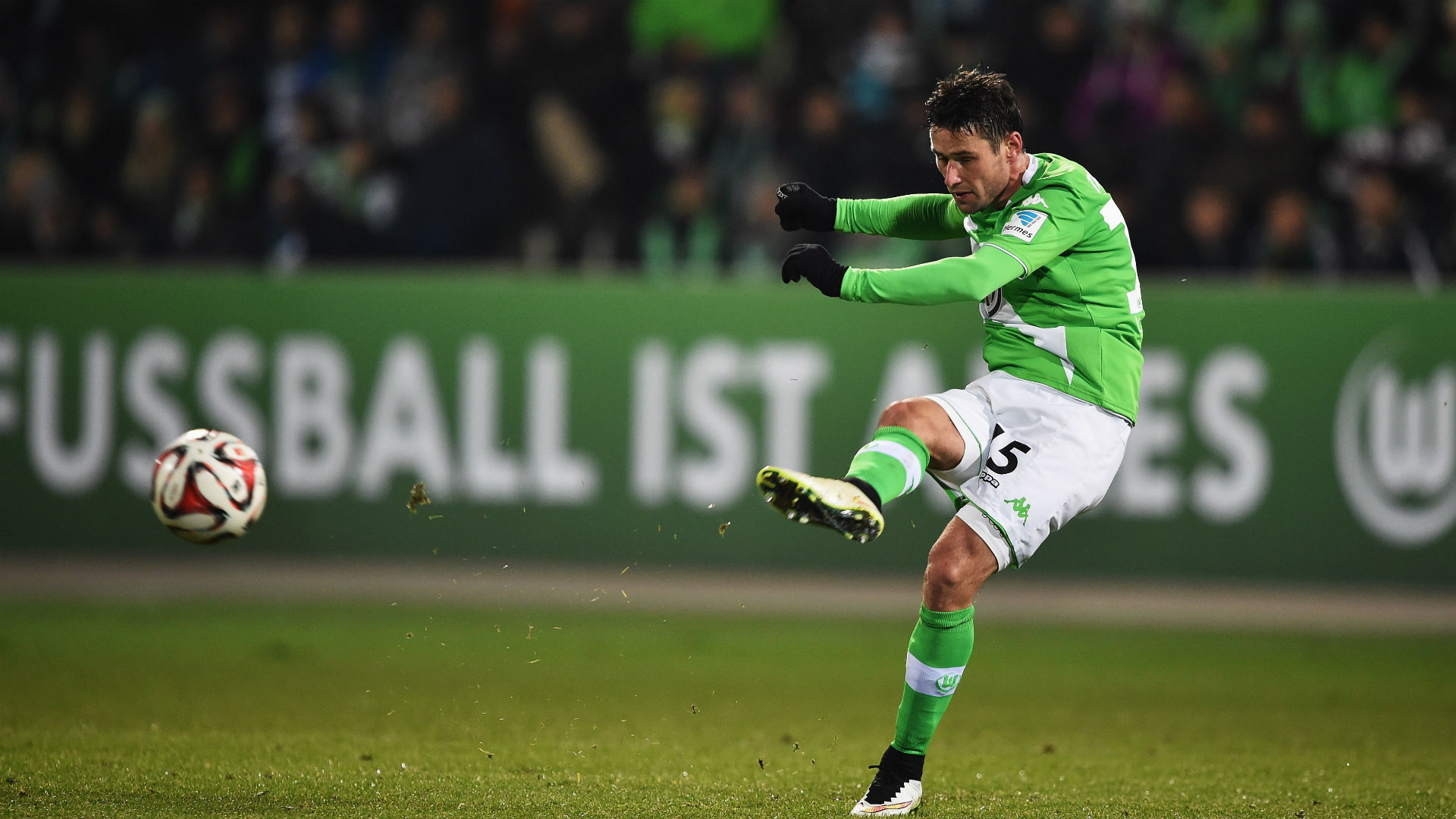 Heading into December 2015, everything seemed to be cruising along fine for Wolfsburg. Their point total was lagging from their excellent 2nd-place season the year before, but that was fine because they had greatly over-performed their underlying performance to reach those heights. The loss of Kevin de Bruyne didn't seem to have harmed their performances. Then it all fell apart. They won 1 out of 10 matches, broke that slump with back-to-back wins, and then cratered with another 7-match winless streak. They played like a mid-table team down the stretch and had no claim to deserve a top 4 spot. That sets up this year as a huge season in the Wolfsburg story. Another finish outside the top 4, a Draxler exit, a Volkswagen pullback and it could be a serious dry spell.
Heading into December 2015, everything seemed to be cruising along fine for Wolfsburg. Their point total was lagging from their excellent 2nd-place season the year before, but that was fine because they had greatly over-performed their underlying performance to reach those heights. The loss of Kevin de Bruyne didn't seem to have harmed their performances. Then it all fell apart. They won 1 out of 10 matches, broke that slump with back-to-back wins, and then cratered with another 7-match winless streak. They played like a mid-table team down the stretch and had no claim to deserve a top 4 spot. That sets up this year as a huge season in the Wolfsburg story. Another finish outside the top 4, a Draxler exit, a Volkswagen pullback and it could be a serious dry spell. 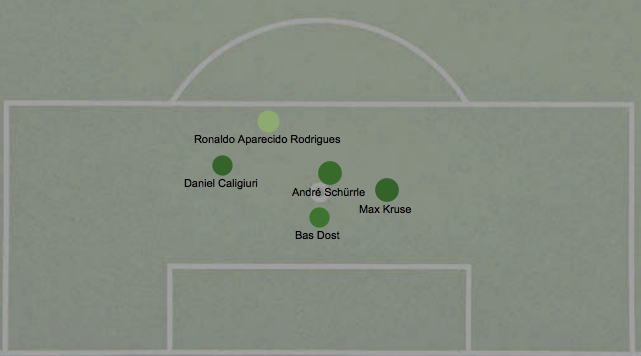 In: Yannick Gerhardt 13m (Köln), Jeffrey Bruma 11.5m (PSV), Josip Brekalo 6m (Dinamo Zagreb), Jakub Blaszczykowski 5m (Dortmund), Victor Osimhen 3.5m (Ultimate Strikers-Nigeria), Daniel Didavi free (Stuttgart) Out: André Schürrle, Max Kruse, Naldo Key Passing Combinations Naldo-Guilavogui Träsch-Vierinha Draxler-Kruse Rodriguez-Draxler Arnold-Schürrle
In: Yannick Gerhardt 13m (Köln), Jeffrey Bruma 11.5m (PSV), Josip Brekalo 6m (Dinamo Zagreb), Jakub Blaszczykowski 5m (Dortmund), Victor Osimhen 3.5m (Ultimate Strikers-Nigeria), Daniel Didavi free (Stuttgart) Out: André Schürrle, Max Kruse, Naldo Key Passing Combinations Naldo-Guilavogui Träsch-Vierinha Draxler-Kruse Rodriguez-Draxler Arnold-Schürrle 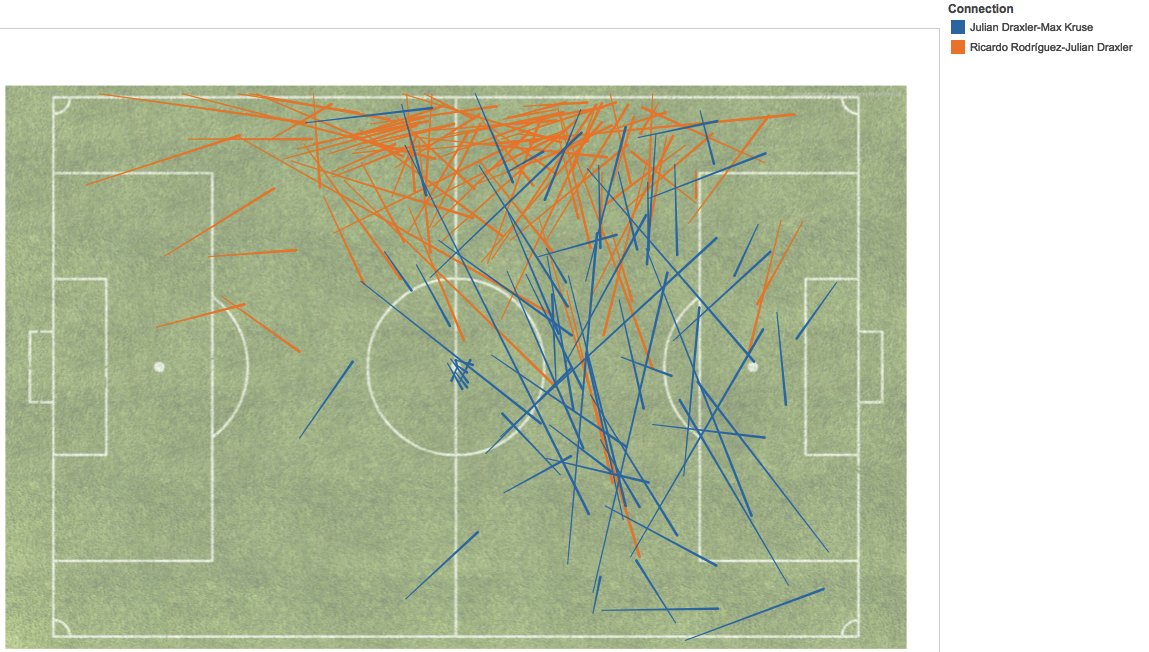 One Big Strength: Avoiding tap-ins allowed. No team allowed a lower share of shots inside 10 yards than Wolfsburg at 13%. They did this somehow without having an above average shot distance allowed, which is kind of bizarre when you think about it. Compare their shot chart allowed to Ingolstadt's, who allowed similar shot total with similar shot distance allowed, and focus on the six yard box.
One Big Strength: Avoiding tap-ins allowed. No team allowed a lower share of shots inside 10 yards than Wolfsburg at 13%. They did this somehow without having an above average shot distance allowed, which is kind of bizarre when you think about it. Compare their shot chart allowed to Ingolstadt's, who allowed similar shot total with similar shot distance allowed, and focus on the six yard box. 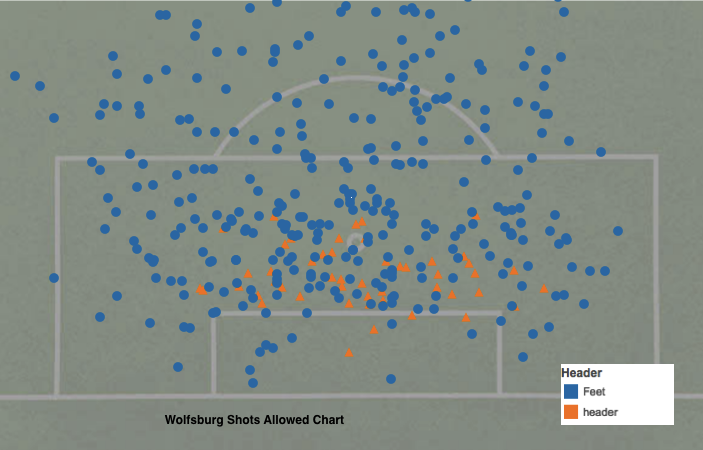
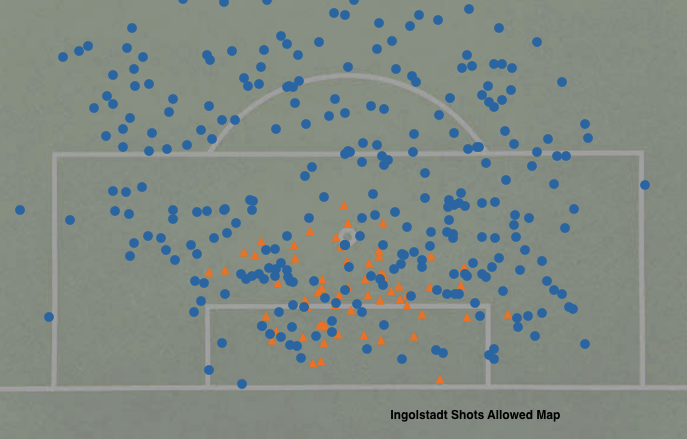 Ingolstadt allowed 21 shots from the foot and 19 headers in the box while Wolfsburg were at 10 via foot and 4 on the head. All this despite an average shot distance of 18.5 vs Ingolstadt's 18.2. So I admit I cheated a bit. Maybe this is a strength or maybe it's be a warning sign that next year a chunk of those 15 yard shots edge 6 yards closer. One Big Weakness: Wolfsburg are like your friend with the good job, great girlfriend, new car, and a pack-a-day smoking problem. Most of their life looks good on the surface, but there is one glaring problem that is flashing DANGER. For Wolfsburg it's not the tempting coolness of a camel with sunglasses but the ease of playing a ball out wide and having someone whip in a long cross.
Ingolstadt allowed 21 shots from the foot and 19 headers in the box while Wolfsburg were at 10 via foot and 4 on the head. All this despite an average shot distance of 18.5 vs Ingolstadt's 18.2. So I admit I cheated a bit. Maybe this is a strength or maybe it's be a warning sign that next year a chunk of those 15 yard shots edge 6 yards closer. One Big Weakness: Wolfsburg are like your friend with the good job, great girlfriend, new car, and a pack-a-day smoking problem. Most of their life looks good on the surface, but there is one glaring problem that is flashing DANGER. For Wolfsburg it's not the tempting coolness of a camel with sunglasses but the ease of playing a ball out wide and having someone whip in a long cross. 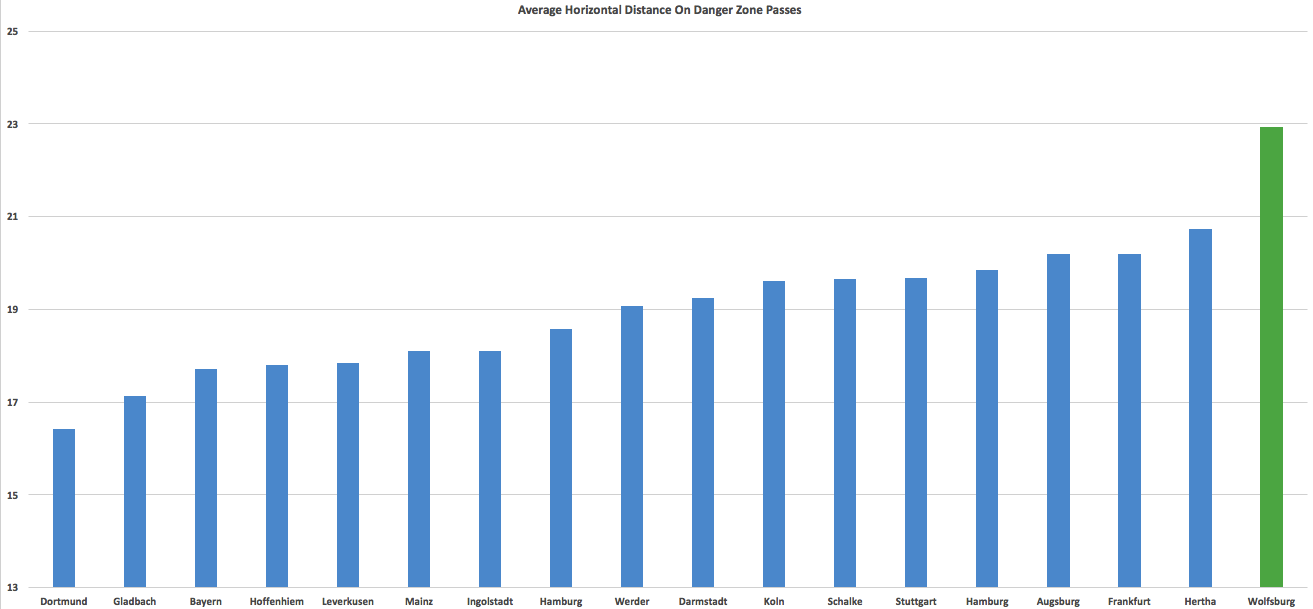
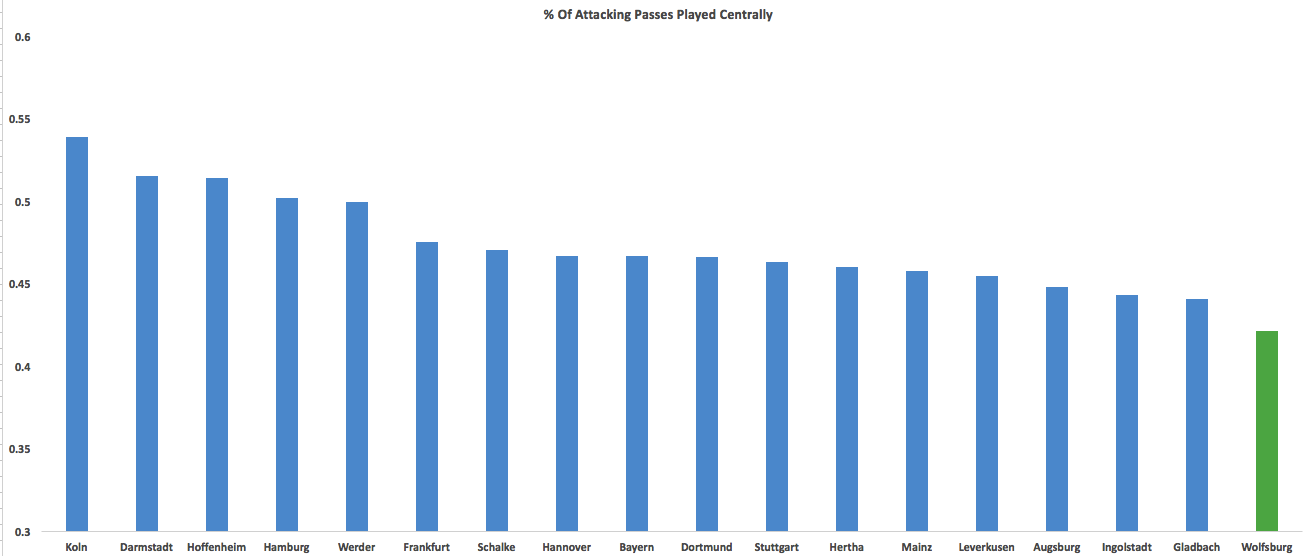 They have super-attacking fullbacks in Ricardo Rodriguez and especially Christian Träsch but as you can see from the first graph, great scoring teams generally do not just throw it out to the sidelines and say try to pick out our guys head in the center. Wolfsburg (in a sampling of shots) had 2.8 men in the box for their shots, while the 4 UCL teams all had 3+ on average with Leverkusen and Bayern at 3.5. Only Werder Bremen and Hannover had a lower ratio of attacking players to defenders in the box. All this to say, Wolfsburg have a glaring flaw that spraying a bit of air freshener isn't going to conceal. This became more and more frustrating to watch with superstar Julian Draxler alongside Max Kruse, who was key in Gladbach's short-passing approach in previous years. Kruse ate his way out of Wolfsburg and Draxler is clamoring for a move (though Wolfsburg have said he will play with them this year). They had the talent to quit cold turkey but just couldn't do it. The bad habits start back in the midfield where Gustavo and Guilavogui were right at the top when it comes to share of passes played to the flanks.
They have super-attacking fullbacks in Ricardo Rodriguez and especially Christian Träsch but as you can see from the first graph, great scoring teams generally do not just throw it out to the sidelines and say try to pick out our guys head in the center. Wolfsburg (in a sampling of shots) had 2.8 men in the box for their shots, while the 4 UCL teams all had 3+ on average with Leverkusen and Bayern at 3.5. Only Werder Bremen and Hannover had a lower ratio of attacking players to defenders in the box. All this to say, Wolfsburg have a glaring flaw that spraying a bit of air freshener isn't going to conceal. This became more and more frustrating to watch with superstar Julian Draxler alongside Max Kruse, who was key in Gladbach's short-passing approach in previous years. Kruse ate his way out of Wolfsburg and Draxler is clamoring for a move (though Wolfsburg have said he will play with them this year). They had the talent to quit cold turkey but just couldn't do it. The bad habits start back in the midfield where Gustavo and Guilavogui were right at the top when it comes to share of passes played to the flanks. 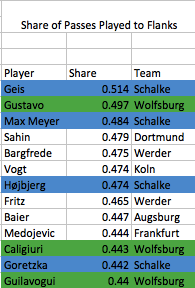 Somehow these guys played nearly 1200 minutes together, when they are suited to only play in the final minutes when you are trying to see out a win. They simply don't handle the ball that often when you look at teams with similar possession. Alonso and Vidal made 198 passes per game, Gündogan and Weigl made 185, Dahoud and Xhaka made 144, but Guilavogui and Gustavo made just 110 per game. 4 center backs or fullbacks (Dante, Naldo, Träsch, RicRod) made more than any midfielders. Wolfsburg midfielders not only rarely touch the ball and mainly play it wide, but when they are handling the ball there is no forward thrust. Guilavogui's passes ended on average 57.5 yards from goal and Gustavo's 59.9. Gustavo was last in this category among midfielders and Hertha's Per Skjelbred was the only player behind Guilavogui. To have 2 of the "top" 3 midfielders that leave you with the most work to do after the ball leaves their hands means your attacks are off to a terrible start. Maximilian Arnold was an improvement when he got into the lineup and Wolfsburg need more of Arnold and new signing Yannick Gerhardt, who both can push the ball forward centrally at least a little more, and should never play Guilavogui and Gustavo together again. Gerhardt had 62% of his receptions come in the opposition half, compared to Gustavo and Guilavogui's 42 and 45% but he's not a Kampl-esque driver forward. Koln were a rather conservative team last season and he wasn't an exception to the rule. He's not such a transcendent talent or so different from Wolfsburg that he's not at risk of being Dietered and start playing passes out to the wings. And, finally, in what might be the best addition of the year. https://www.youtube.com/watch?v=qHf53kLqoLs Gomez put up huge numbers at Besiktas after a lull at Fiorentina and was still good enough to lead the German attack in the Euros. 25% of his shots the past 4 years have come from headers, a more normal number after Dost has basically been at 50/50. Good Season: Didavi plays off Draxler well and a little less selfishly than he did last season. Gerhardt makes runs into the box. Using the fullbacks becomes a dangerous plan B instead of plan A and B. Gomez gets a variety of service and Wolfsburg makes the Champions League. Bad Season: All the nice new toys get Dieterized and Rodriguez and Träsch continue to carry the ball into the final third and Gomez is used basically like Bas Dost. Didavi keeps taking long shots and Draxler's mind wanders toward greener pastures and they hover well off Schalke and Gladbach's pace.
Somehow these guys played nearly 1200 minutes together, when they are suited to only play in the final minutes when you are trying to see out a win. They simply don't handle the ball that often when you look at teams with similar possession. Alonso and Vidal made 198 passes per game, Gündogan and Weigl made 185, Dahoud and Xhaka made 144, but Guilavogui and Gustavo made just 110 per game. 4 center backs or fullbacks (Dante, Naldo, Träsch, RicRod) made more than any midfielders. Wolfsburg midfielders not only rarely touch the ball and mainly play it wide, but when they are handling the ball there is no forward thrust. Guilavogui's passes ended on average 57.5 yards from goal and Gustavo's 59.9. Gustavo was last in this category among midfielders and Hertha's Per Skjelbred was the only player behind Guilavogui. To have 2 of the "top" 3 midfielders that leave you with the most work to do after the ball leaves their hands means your attacks are off to a terrible start. Maximilian Arnold was an improvement when he got into the lineup and Wolfsburg need more of Arnold and new signing Yannick Gerhardt, who both can push the ball forward centrally at least a little more, and should never play Guilavogui and Gustavo together again. Gerhardt had 62% of his receptions come in the opposition half, compared to Gustavo and Guilavogui's 42 and 45% but he's not a Kampl-esque driver forward. Koln were a rather conservative team last season and he wasn't an exception to the rule. He's not such a transcendent talent or so different from Wolfsburg that he's not at risk of being Dietered and start playing passes out to the wings. And, finally, in what might be the best addition of the year. https://www.youtube.com/watch?v=qHf53kLqoLs Gomez put up huge numbers at Besiktas after a lull at Fiorentina and was still good enough to lead the German attack in the Euros. 25% of his shots the past 4 years have come from headers, a more normal number after Dost has basically been at 50/50. Good Season: Didavi plays off Draxler well and a little less selfishly than he did last season. Gerhardt makes runs into the box. Using the fullbacks becomes a dangerous plan B instead of plan A and B. Gomez gets a variety of service and Wolfsburg makes the Champions League. Bad Season: All the nice new toys get Dieterized and Rodriguez and Träsch continue to carry the ball into the final third and Gomez is used basically like Bas Dost. Didavi keeps taking long shots and Draxler's mind wanders toward greener pastures and they hover well off Schalke and Gladbach's pace.
2016
Way Out Wide With Wolfsburg
By admin
|
August 22, 2016
